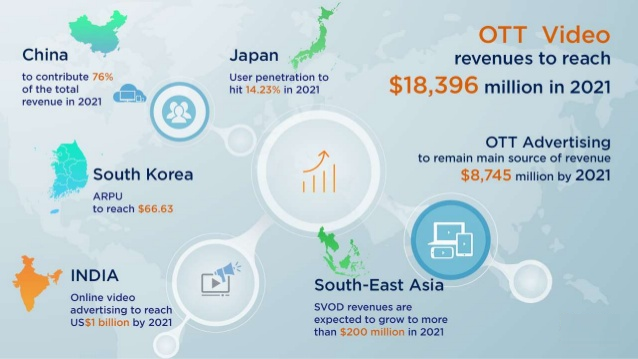Over the Top Platform in India
This article is based on “Digital innovation is the way forward for media, sport industry” It talks about the benefits and challenges associated with the use of Over the Top Platform ("OTT") in India.
The Covid-19 pandemic has impacted every single industry, but the businesses that were most affected are those which solely rely on social gathering of people and the media and entertainment industry is not an exception.
However, Over the Top (OTT) platforms such as Netflix, Hotstar, Prime Video and online gaming are booming in this time of crisis, thereby testifying the ongoing information revolution.
Though the Indian media landscape has traditionally been very dynamic, the issue of content regulation has always been important in India because of the diverse nature of Indian society in terms of religion, economic status, caste and language.Therefore, the effect that OTT has on society forms the basis of its regulation by the state.
Thus, there is a need to understand both the benefits and challenges associated with the use of Over the Top Platform (OTT) in India.
Benefits Associated with OTT Platforms
- Creative Use of Media: As OTT platforms are relatively less subjected to censorship, it helps bring socio-political content or matters to a common man, which otherwise are censored in mainstream media.
- On Demand Media Consumption: The OTT services have a hybrid character as they combine the passive consumption mode of television and the consumer choice of the web.
- Thus, OTT platforms' advantage of playing media anywhere and anytime has created a massive demand for it.
- Sustenance of Media and Entertainment Industry: The future of traditional media platforms such as cinema, live events is in jeopardy. This is even applicable post-Covid era, due to social distancing becoming a norm in the society.
- In this context, OTT platforms serve as a parallel dissemination source of infotainment.
- Democratisation of Media: OTT industry is benefiting numerous content producers and artists.
- It also helps in accessing regional films around the country as well as globally.
Issues Related to OTT Platforms
- Lack of Regulation: While traditional media in India are regulated under specific laws such as:
- Films are regulated under the Cinematograph Act of 1952—which provides for the certification of cinematograph films for public exhibition.
- The Cable Television Networks (Regulation) Act, 1995 —that applies to content appearing on cable televisions.
- However, there is no such specific law for regulation of content over OTT platforms.
- Censorship Problem: Generally, the Government in India censors the content on grounds of public morality, communal harmony or cultural preservation, among various reasons.
- However, due to the lack of censorship, content on OTT platforms can disrupt social harmony and moral fabric of society.
- No Consensus of Self Regulation: OTT platforms had signed a self-regulation code under the aegis of the Internet and Mobile Association of India. However, there’s no consensus on the code amongst the various OTT platforms operating in India.
- Cultural Homogenisation: India is projected to become the second largest online video-viewing audience by 2020. In this context, OTT platforms are streaming a lot of cross-cultural content.
- Though it is good for creating a cosmopolitan world, it has aggravated some of the means in the society like cultural imperialism.
Conclusion
While the government recognizes the need for self-regulation in OTT, it wants video streaming platforms to agree to a common code.
Besides, there is a need to include online content explicitly within the ambit of this common code which will prohibit indecency in video streaming,advertisements, books, films, paintings, and writings etc.
|
Drishti Mains Question Critically discuss the benefits and challenges associated with the use of Over the Top (OTT) platform in India. |
This editorial is based on “Tall Claims” which was published in The Indian Express on June 26th, 2020. Now watch this on our Youtube channel.

